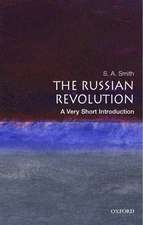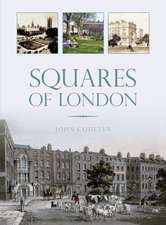The Nation and its Ruins: Antiquity, Archaeology, and National Imagination in Greece: Classical Presences
Autor Yannis Hamilakisen Limba Engleză Hardback – 2 aug 2007
| Toate formatele și edițiile | Preț | Express |
|---|---|---|
| Paperback (1) | 448.88 lei 31-37 zile | |
| Oxford University Press – 30 iul 2009 | 448.88 lei 31-37 zile | |
| Hardback (1) | 760.17 lei 31-37 zile | |
| OUP OXFORD – 2 aug 2007 | 760.17 lei 31-37 zile |
Din seria Classical Presences
- 28%
 Preț: 473.71 lei
Preț: 473.71 lei - 30%
 Preț: 493.26 lei
Preț: 493.26 lei - 30%
 Preț: 501.15 lei
Preț: 501.15 lei - 27%
 Preț: 476.23 lei
Preț: 476.23 lei - 6%
 Preț: 337.35 lei
Preț: 337.35 lei - 30%
 Preț: 540.38 lei
Preț: 540.38 lei - 28%
 Preț: 474.92 lei
Preț: 474.92 lei - 30%
 Preț: 501.92 lei
Preț: 501.92 lei - 6%
 Preț: 226.46 lei
Preț: 226.46 lei - 25%
 Preț: 687.80 lei
Preț: 687.80 lei - 17%
 Preț: 582.93 lei
Preț: 582.93 lei - 30%
 Preț: 821.25 lei
Preț: 821.25 lei - 26%
 Preț: 614.24 lei
Preț: 614.24 lei - 19%
 Preț: 677.96 lei
Preț: 677.96 lei - 18%
 Preț: 704.79 lei
Preț: 704.79 lei - 30%
 Preț: 538.77 lei
Preț: 538.77 lei - 30%
 Preț: 645.95 lei
Preț: 645.95 lei - 30%
 Preț: 501.52 lei
Preț: 501.52 lei - 30%
 Preț: 617.54 lei
Preț: 617.54 lei - 27%
 Preț: 519.88 lei
Preț: 519.88 lei - 16%
 Preț: 706.89 lei
Preț: 706.89 lei - 25%
 Preț: 554.32 lei
Preț: 554.32 lei - 16%
 Preț: 584.68 lei
Preț: 584.68 lei - 30%
 Preț: 562.14 lei
Preț: 562.14 lei - 30%
 Preț: 598.80 lei
Preț: 598.80 lei - 25%
 Preț: 612.31 lei
Preț: 612.31 lei - 30%
 Preț: 589.73 lei
Preț: 589.73 lei - 30%
 Preț: 789.84 lei
Preț: 789.84 lei - 30%
 Preț: 600.20 lei
Preț: 600.20 lei - 30%
 Preț: 611.82 lei
Preț: 611.82 lei - 29%
 Preț: 1083.87 lei
Preț: 1083.87 lei - 30%
 Preț: 720.23 lei
Preț: 720.23 lei - 19%
 Preț: 326.97 lei
Preț: 326.97 lei - 30%
 Preț: 833.88 lei
Preț: 833.88 lei -
 Preț: 307.88 lei
Preț: 307.88 lei - 28%
 Preț: 446.91 lei
Preț: 446.91 lei - 30%
 Preț: 721.88 lei
Preț: 721.88 lei - 30%
 Preț: 575.88 lei
Preț: 575.88 lei - 30%
 Preț: 598.02 lei
Preț: 598.02 lei - 30%
 Preț: 803.03 lei
Preț: 803.03 lei - 30%
 Preț: 733.67 lei
Preț: 733.67 lei - 30%
 Preț: 701.54 lei
Preț: 701.54 lei - 30%
 Preț: 601.52 lei
Preț: 601.52 lei - 30%
 Preț: 747.48 lei
Preț: 747.48 lei - 30%
 Preț: 556.05 lei
Preț: 556.05 lei - 30%
 Preț: 818.03 lei
Preț: 818.03 lei - 30%
 Preț: 716.96 lei
Preț: 716.96 lei
Preț: 760.17 lei
Preț vechi: 1028.71 lei
-26% Nou
Puncte Express: 1140
Preț estimativ în valută:
145.45€ • 151.87$ • 120.39£
145.45€ • 151.87$ • 120.39£
Carte tipărită la comandă
Livrare economică 25-31 martie
Preluare comenzi: 021 569.72.76
Specificații
ISBN-13: 9780199230389
ISBN-10: 0199230382
Pagini: 376
Ilustrații: numerous halftones
Dimensiuni: 145 x 222 x 26 mm
Greutate: 0.58 kg
Editura: OUP OXFORD
Colecția OUP Oxford
Seria Classical Presences
Locul publicării:Oxford, United Kingdom
ISBN-10: 0199230382
Pagini: 376
Ilustrații: numerous halftones
Dimensiuni: 145 x 222 x 26 mm
Greutate: 0.58 kg
Editura: OUP OXFORD
Colecția OUP Oxford
Seria Classical Presences
Locul publicării:Oxford, United Kingdom
Recenzii
A Nation and Its Ruins provides an interesting set of case-studies that are drawn together to answer questions that apply to a broad range of archaeological, political, and cultural questions...only with archaeologists who work in Greece...but to a wide audience of archaeologists and anthropologists
a highly readable and important book
compelling
he Nation and its Ruins deserves our close attention
This book is to be welcome for the solid grounding it provides in facts that tend to be either ignored or taken for granted alike by professional archaeologists, by popularizers, and by the millions who visit archaeological sites in Greece each year...Hamilakis sets out to reintegrate the two components of his book's title, The Nation and its Ruins , and he succeeds impressively.
an excellent contribution... thoretically informed [and]... a great read.
...theoretically informed, yet clearly written; it is an important contribution.
... intellectually engaging, captivating in its dexterous use of narrative, and skillfully mines ethnohistoric texts.
We have been waiting for a book like this for years.
a remarkable contribution to a growing body of work.
... a wonderful book...Hamilakis is known, not only within archaeology, for his radically inter-disciplinary work.
...an in-depth enquiry into the role which material remains play in constructing a certain imagery of the past in Greece...By focusing on the materiality of ruins themselves, Hamilakis adds an important dimension to our understanding of the sources of nationalist identities.
The first serious study of the cultural role of archaeology in Greek society
A stimulating book...This volume will be essential reading for anyone interested in the modern use of the past in Greece.
Hamilakis raises a series of important and interesting issues...It is certainly the first time this subject has been analysed in book length and from the perspective of such an updated theoretical framework.
The Nation and its Ruins is an absorbing attempt to provide a window on the contemporary Greek soul via a study of the place of its spectacular cultural heritage in the nation's collective sense of identity. The judges' views on this fascinating study provided an interesting conspectus of attitudes to the political and cultural use of archaeological remains, and a nation's sense of responsibility of its past material culture. We resolved to shortlist it as an important contribution to that debate and its history in the context of the spotlight shed on it by such recent events as the Athens Olympics and the ripples they spread. We shall continue to take it seriously as a mood statement of its time.
The Nation and its Ruins adds a distinctive new voice and vision...Hamilakis adds a new challenge to simplistic separations of the modern from the pre-modern...[He] is an erudite and elegant writer [and his] magnificently crafted argument deserves...a readership extending well beyond regional specialisations..."
One cannot help but be positive about a book that provides such persuasive arguments...[it] has a flowing text that skillfully combines academic research with informal sources...The Nation and its Ruins deserves our close attention not only because it is a broad and in-depth study of the role of material culture in Greek society through time, but also it might trigger further studies...
There is no doubt that The Nation and Its Ruins will become essential reading for all interested in the deeper sociopolitical dimensions of the history of archaeology...Hamilakis has produced the most perceptive and penetrating analysis to date of the modern social context of Greek archaeology and has provided an invaluable model for those who seek to embark on similar research in other regions of the world.
Hamilakis is one of the few scholars studying the reception of ancient Greece using a real diversity of material remains... Combining ethnographic and sociological data with primary documentary and visual culture, he covers a rare diachronic range of receiving societiesmainly within Greece, where the remains have an especially strong resonance... These extremely important and novel angles of research are now combined in a highly readable and important book...
[T]his work will [be] resonant not only with archaeologists who work in Greece ...but to a wider audience of archaeologists and anthropologists who deal with similar issues in other countries of the world every day... [H]is discussion of the Elgin marble debate in Chapter 7 provides one of best discussions of the topic available, and I will be using it to introduce my students to some of these crucial issues.
a highly readable and important book
compelling
he Nation and its Ruins deserves our close attention
This book is to be welcome for the solid grounding it provides in facts that tend to be either ignored or taken for granted alike by professional archaeologists, by popularizers, and by the millions who visit archaeological sites in Greece each year...Hamilakis sets out to reintegrate the two components of his book's title, The Nation and its Ruins , and he succeeds impressively.
an excellent contribution... thoretically informed [and]... a great read.
...theoretically informed, yet clearly written; it is an important contribution.
... intellectually engaging, captivating in its dexterous use of narrative, and skillfully mines ethnohistoric texts.
We have been waiting for a book like this for years.
a remarkable contribution to a growing body of work.
... a wonderful book...Hamilakis is known, not only within archaeology, for his radically inter-disciplinary work.
...an in-depth enquiry into the role which material remains play in constructing a certain imagery of the past in Greece...By focusing on the materiality of ruins themselves, Hamilakis adds an important dimension to our understanding of the sources of nationalist identities.
The first serious study of the cultural role of archaeology in Greek society
A stimulating book...This volume will be essential reading for anyone interested in the modern use of the past in Greece.
Hamilakis raises a series of important and interesting issues...It is certainly the first time this subject has been analysed in book length and from the perspective of such an updated theoretical framework.
The Nation and its Ruins is an absorbing attempt to provide a window on the contemporary Greek soul via a study of the place of its spectacular cultural heritage in the nation's collective sense of identity. The judges' views on this fascinating study provided an interesting conspectus of attitudes to the political and cultural use of archaeological remains, and a nation's sense of responsibility of its past material culture. We resolved to shortlist it as an important contribution to that debate and its history in the context of the spotlight shed on it by such recent events as the Athens Olympics and the ripples they spread. We shall continue to take it seriously as a mood statement of its time.
The Nation and its Ruins adds a distinctive new voice and vision...Hamilakis adds a new challenge to simplistic separations of the modern from the pre-modern...[He] is an erudite and elegant writer [and his] magnificently crafted argument deserves...a readership extending well beyond regional specialisations..."
One cannot help but be positive about a book that provides such persuasive arguments...[it] has a flowing text that skillfully combines academic research with informal sources...The Nation and its Ruins deserves our close attention not only because it is a broad and in-depth study of the role of material culture in Greek society through time, but also it might trigger further studies...
There is no doubt that The Nation and Its Ruins will become essential reading for all interested in the deeper sociopolitical dimensions of the history of archaeology...Hamilakis has produced the most perceptive and penetrating analysis to date of the modern social context of Greek archaeology and has provided an invaluable model for those who seek to embark on similar research in other regions of the world.
Hamilakis is one of the few scholars studying the reception of ancient Greece using a real diversity of material remains... Combining ethnographic and sociological data with primary documentary and visual culture, he covers a rare diachronic range of receiving societiesmainly within Greece, where the remains have an especially strong resonance... These extremely important and novel angles of research are now combined in a highly readable and important book...
[T]his work will [be] resonant not only with archaeologists who work in Greece ...but to a wider audience of archaeologists and anthropologists who deal with similar issues in other countries of the world every day... [H]is discussion of the Elgin marble debate in Chapter 7 provides one of best discussions of the topic available, and I will be using it to introduce my students to some of these crucial issues.
Notă biografică
Yannis Hamilakis is Senior Lecturer in Archaeology at the University of Southampton.










